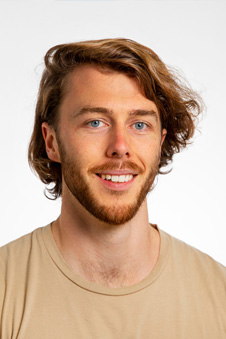

George Taiaroa
George Taiaroa: Communicable diseases, kaitiakitanga, and the COVID frontline
20Twenties Young Alumni Award winner in recognition of research work in response to COVID-19. BSC Major in Genetics and Plant Biotechnology 2013, BSc(Hons) Major Plant Biotechnology 2014.
 What was your reaction to receiving the award?
What was your reaction to receiving the award?
I was grateful to be listed alongside such talented and hard-working Otago alumni. It has been a great opportunity to hear about and celebrate the achievements of others.
 What have you done since graduation and what are you doing now?
What have you done since graduation and what are you doing now?
I continued at Otago studying towards a PhD in Biochemistry, before moving to Melbourne to take up a role as a Research Fellow at the Doherty Institute for Infection and Immunity at the University of Melbourne.
My research at Otago focused on infectious diseases and their diagnoses, aiming to support public health measures and improve patient outcomes. As a student, I was fortunate to receive the University of Otago Translational Research Award, alongside my supervisors. It is somewhat surreal to look back at the press from then and see 'emerging viruses' as an area listed as benefiting from more accessible diagnostics.
I brought the same focus to Melbourne, where I have been involved in the research and public health responses to a number of infectious diseases, most notably SARS-CoV-2/COVID-19. In January, I was part of a team of Doherty Institute scientists able to grow and share the 'novel coronavirus'. This provided international WHO-collaborating laboratories with a much-needed resource for diagnostic evaluation and vaccine development. Later in the year, the broader implementation of COVID testing and genomics in Victoria was a major challenge, and I had more shifts than I care to admit running the relevant tests at the central Victorian Infectious Disease Reference Laboratory (VIDRL), where I have held an honorary appointment since arriving in Melbourne.
Closer to home, I have continuing collaborations with Otago researchers, including efforts to address scabies and impetigo in Samoa alongside a group of incredible Samoan health professionals. This has been hugely rewarding work, and I feel like we are just getting warmed up.
 What inspires and motivates you to work in the areas you are involved with?
What inspires and motivates you to work in the areas you are involved with?
On a day-to-day basis, I think I have been motivated by my colleagues primarily. During this year in particular, the community has felt like we were all pulling the catch as one, to paraphrase a Fat Freddy's Drop song. Given the nature of the pandemic, people from across states and countries share the victories, and are there with a kind word on those particularly hard days. The strong public service culture has been incredible to see.
As a long-term motivation, I think communicable diseases remain one of the great challenges of our generation. There are so many links between these and social determinants of health, such as access to clean water, shelter or medical care. They also endanger local taonga species and ecosystems, and management of communicable diseases is a part of the broader concept of kaitiakitanga. Each morning, it's easy to head to work when you feel connected to your community and the land you love in this way.
 What were the highlights of your time at Otago, and has it helped you in your career and following your interests?
What were the highlights of your time at Otago, and has it helped you in your career and following your interests?
The culture at Otago has to be a highlight. Having students based at a central campus gives a sense of community that you don't find elsewhere, and the coast and Central Otago are right at your doorstep. Academically, mentors, supervisors and friends at Otago have continued to back me throughout my studies and my professional career. I could not be more grateful for them, and can only hope to be as caring and supportive of others going forward.
I feel like I am right where I should be for a career, and that Otago played a central role in guiding me here, as well as making sure that I was equipped for the task.
